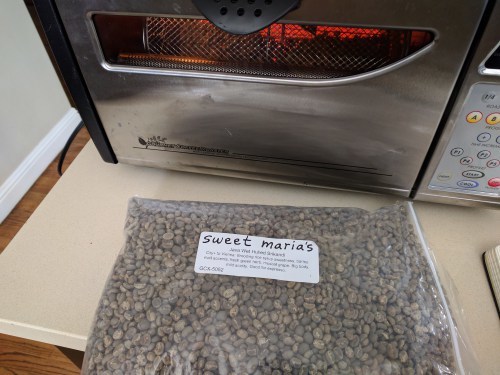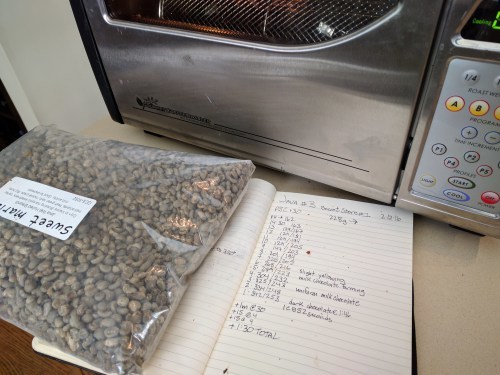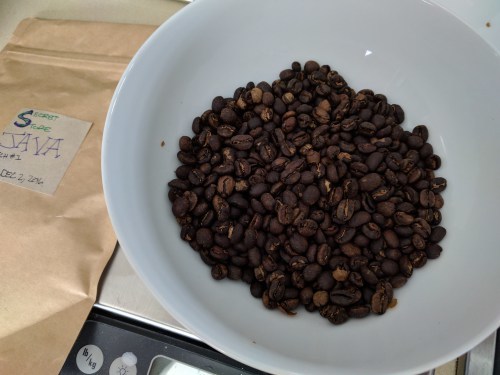Since I’m not drinking this year, I haven’t been making beer. But I still like to make food things, so I’ve been teaching myself how to bake bread and roast coffee beans.
So the thing about making beer is that it really isn’t that difficult. Brooklyn Brew Shop says If you can make oatmeal, you can make beer, and it is entirely true. If you can just follow a recipe, you can turn malted barley, water, hops, and yeast into beer.
The thing about baking bread is that there’s a little more intuition to it than making beer, but not much. It’s incredibly satisfying to mix up flour, water, salt, and yeast by hand, fold the dough, let it rise, shape it into loaves, and bake it. There are all sorts of different types of bread to make, but that basic combination is pretty easy to understand. Like brewing, if you can follow directions, you can turn those things into bread.
Roasting coffee, though, is much more difficult to perfect. I’m using a smart roaster (the Behmor 1600+) that controls the delicate parts of the process, including the heat curve, the speed of the turning drum that holds the beans, and the cooling process. But roasting coffee isn’t something where you put the beans in, push some buttons, and wait until PRESTO you have roasted coffee beans. There’s a steep and complex learning curve (at least there was for me) and a very small margin of error. In my experience, when I’m roasting 1/4 pound to 1/2 pound of beans, there’s anywhere from 15 to 45 seconds of intense terror that I have to watch very closely, because in that tiny window of time, I’ll either end up with something decent or a complete a pile of fail. Unlike beer, which can sometimes end up not as hoppy or malty as I wanted, but still be drinkable, or bread, which may not rise as much as I wanted but still makes a nice tartine, if the coffee beans are off, they pretty much have to go into the trash. I mean, unless you’re really into wet cardboard.
So it was kind of a big deal for me recently when I had acquired enough data to feel like I knew what I was doing, and could reasonably expect the raw beans I put into the roaster to come out tasting like something I wanted to drink and share with others. (I didn’t mention that roasting coffee beans provides an opportunity for lots of notes, just like brewing and baking does, and it’s essential to do that if you want to get anywhere close to mastering it).
Anyway, I decided to offer some beans in the secret store, and the first batch came out yesterday. It’s pretty much exactly how I wanted it to come out, and I’m proud of myself, so I put some pictures from the roast on the other side of the jump, along with some notes on the process.

Getting started.

Not sure why the display photographed that way, but I’m just about four minutes in. You can see in my notes where I record the wall and exhaust temperatures at each minute.

All done, and it’s cooling. I ended up adding 1:30 to the total time. That happened during the 45 second window of terror.

Weighing out the beans. I wanted them to be about this dark (the lighter patches you see are from chaff that didn’t blow off completely), so the bean’s unique flavors could come through without too much acidity. I feel like this batch went up to about 15 to 30 seconds short of second crack.
I’m roasting some more today, and my house smells great. There’s also some pure levain sourdough bulk fermenting, that I’ll shape and proof in about an hour or so. The kitchen at Castle Wheaton is getting all kinds of action today.




 newest »
newest »
 newest »
newest »
 "programming is the process of converting caffeine into error messages"
"programming is the process of converting caffeine into error messages" 











I've been following your "bread updates" and I'm so glad you're enjoying this. Keep up the good work! I may try this myself one day.